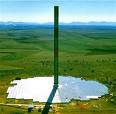 A solar tower is a device that converts solar thermal energy (heat from the sun) into electricity. Solar towers are suitable for large-scale power generation.
A solar tower is a device that converts solar thermal energy (heat from the sun) into electricity. Solar towers are suitable for large-scale power generation.
The Basic Component Parts of a Solar Tower Energy Plant
* Solar Tower – The solar tower is simply a large structure with a boiler (a tank used to heat liquids) at the top. The boiler collects the heat from the sun. It is also referred to as the “central tower” or “power tower”.
* Heliostats – These are movable mirrors that track the sun and reflect the sunlight at the top of the solar tower where the heat is collected. These mirrors move as the sun moves, so as to continuously reflect maximum sunlight toward the tower.
* Heat Transfer Fluid – The reason we use the term “heat transfer fluid” is because not all solar towers use the same. Early solar towers used water to collect the heat from the sun. Some of the newer solar towers use liquid sodium. Whichever liquid is used, it is referred to as “heat transfer fluid.”
* Heat Storage – Because we still want to generate energy at night after the sun is gone, newer solar towers have methods of storing heat so that it can be used during the night to continue generating electricity.
* Steam Generator – As stated earlier, liquid sodium is now used to collect the heat, and the liquid sodium is then used to generate steam.
* Steam Turbine – A steam turbine is a generator that uses steam to generate electrical power. This is the same set-up as is used in a conventional power plant.
How Does a Solar Tower Work?
Computer controlled mirrors called heliostats track the sun, adjusting their position as the sun moves, and reflect sunlight toward the top of the solar tower, where a heat collector tank is located. Of course, more than one heliostat is needed, so an arrangement of hundreds or even thousands of heliostats is used.
The combined reflected sunlight of these heliostats is capable of producing temperatures as high as 550 degrees, Celsius at the focus point.
The liquid inside the boiler is thus rapidly heated and then pumped downward into storage tanks, or directly into to a heat exchanger where it is used to make steam.
The steam produced by the heat exchanger is then led through a steam turbine, which uses the steam to generate electricity.
As an interesting note, liquid sodium is used as a heat transfer/storage liquid, due to its ability to hold and store heat efficiently. Large storage tanks can be used to hold the heated liquid sodium. The stored “heat” can then be used at night, so as to continue generating steam which is used to generate electricity.
Currently, there are two solar towers in operation using the above design. The 64 MW Nevada Solar One and 11 MW PS10 solar power tower in Spain.
Solar tower energy is categorized as CSP (concentrated solar power) technology. There are several other power plant designs which use concentrated solar power technology. This includes the parabolic trough and the solar dish engine.
Learn more about Solar Power, Alternative Energy, and broad-scale solutions for Solar Power.
 Alternative Energy HQ solar power for homes, wind energy, and bio fuel issues
Alternative Energy HQ solar power for homes, wind energy, and bio fuel issues






